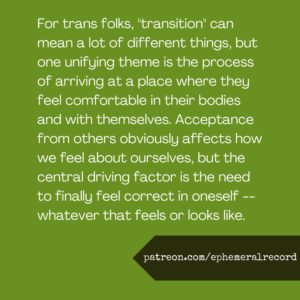Yesterday marked my fourth month on testosterone. After a few weeks, my voice was decidedly deeper. A month in, the increase in facial hair was noticeable, though it remains patchy. Now, after a few months, I can see the changes in fat distribution in my face as I begin to look more like me. This is not the beginning of my transition.
I’m one of those annoying trans people who has always known that they weren’t the gender they were assigned at birth, but didn’t feel quite like the other default option presented. However, as a child I wasn’t given the space to explore what that meant. Every time I tried to wear clothes or share interests that were deemed “inappropriate,” I was socially punished for it: mocked, teased, harassed, and sometimes physically hurt.
Growing up in small town Ontario in the ’80s did not provide me with a rich and robust understanding of what it meant to be a trans person. The only trans people I encountered were through sensationalist talk shows or transphobic depictions in film and television. They were reviled in media and in conversation about that media. “Trans” would be a label it took me many years to adopt, even after I publicly came out, and even though it seems perfectly obvious in hindsight that I’ve always been trans.
So, when does transition start?
There is a divide between cisgender folks who see “transition” as a process of a transgender person becoming legible to them as the gender they claim themselves to be, and how trans people actually experience it. For some cis folks, “transition” hinges on cis person’s acceptance of the trans person “passing” sufficiently enough to “fool” them, and this understanding is rooted in transphobia and transmisogyny. There is an expectation that a person transitions medically and that once a trans person has been on hormones for a sufficient amount of time and received the appropriate surgeries, then they are “finished” their transition, and can “really” live as the gender they assert themselves to be. However, none of this is what transition looks like from the inside. It ignores the reality of the difficulty and expense of accessing appropriate health care, not to mention legal and health issues that make it prohibitive for a trans person to receive that care, or whether medical transition is even desirable at all.
For trans folks, “transition” can mean a lot of different things, but one unifying theme is the process of arriving at a place where they feel comfortable in their bodies and with themselves. Acceptance from others obviously affects how we feel about ourselves, but the central driving factor is the need to finally feel correct in oneself — whatever that feels or looks like.
To read the full post, “Why ‘transition’ is a fraught concept,” please subscribe to Ephemeral Record.
Pullquotes






